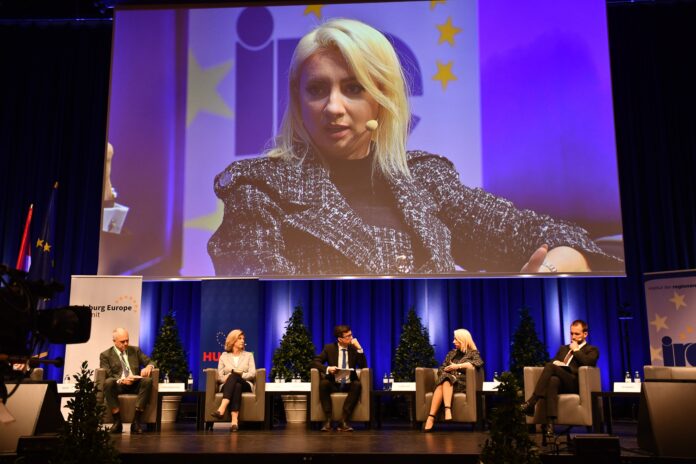Minister of European Affairs Maida Gorčević participated in the Europe Summit organized by the Institute of the Regions of Europe (IRE) in Salzburg, where she spoke on the panel “EU Enlargement: A Geopolitical Necessity.” The panel was opened by Austria’s Minister for the EU and Constitution, Karoline Edtstadler.
Minister Edtstadler stated in her opening remarks that it is no longer a question of whether, but rather how the Union and its member states can assist candidate countries on their path to EU membership.
“We believe Montenegro can become the 28th member of the European Union by 2028. It is our responsibility to show that the Union is open to new candidates and to build a strong and resilient EU. We will support you from the EU side,” Edtstadler said before the panel began.
Minister Gorčević stated that Montenegro has a plan aligned with the European Commission to close all negotiation chapters by the end of 2026 aiming to become the next member of the European Union by 2028.
She recalled that this government managed to secure the appointment of judicial officials within its first 100 days in office, stressing that it had long been a key obstacle to further progress. She emphasized that this challenge was overcome through discussions with both ruling and opposition parties, despite lacking a two-thirds majority in Parliament.
“We adopted critical laws few days ago that are essential to close four chapters. This is the first time in seven years that Montenegro is temporarily closing chapters. It is expected to happen at the Intergovernmental conference with the EU by the end of December, marking the third such conference this year after none were held for several years,” Gorčević said.
She concluded that in light of growing challenges such as those witnessed in Moldova and Ukraine, as well as in the Western Balkans, strong support for the EU’s enlargement policy is needed from both the Union and its member states, as European integration is a two-way process.
Asked if there has been negotiation fatigue after 12 years, Minister Gorčević acknowledged that fatigue was inevitable after so many years of Montenegro’s negotiations with the EU which have seen both ups and downs. “This government has identified European integration as one of its priorities and we have set Montenegro back on track and made significant progress in just one year.”
“The process is exhausting and stressful for our administration, especially for a small country like Montenegro with limited capacities. But we remain optimistic because there is no alternative to the European path and its values. We are working very hard, as shown by receiving the IBAR in June and preparing to close chapters by this December,” Gorčević emphasized.
The panelists agreed that the Western Balkans must become part of the European Union, as it is already at the heart of Europe.


